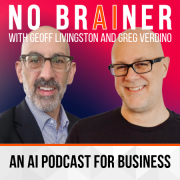OpenAI has been a recurring character on No Brainer, but we’ve resisted the urge to devote a full episode to the company and their blockbuster ChatGPT tool and GPT algorithms.
Well folks, the time has finally come! This is our OpenAI episode. But it might not be what you were expecting. No fawning fan boy hype here. Instead, we’re looking at claims that ChatGPT and the GPT-4 model itself might be suffering from degraded performance, at a time when OpenAI is being battered with a litany of lawsuits, and competitive LLMs are gaining steam.
Is OpenAI losing its lead in the race for generative AI domination? Hear the evidence and find out what we think in today’s No Brainer.
What to Listen For
(Previewing the show with all the ads in place gave use a bit of trouble this time, so these time stamps may be a bit off. They’ll be close enough to land you in the right neighborhood, though.)
-
- 00:00 Intro
- 04:35 We really didn’t want to talk about OpenAI, but…
- 05:55 How OpenAI took the lead in GenAI
- 16:21 Performance problems for ChatGPT and GPT-4?
- 23:58 Legal woes for OpenAI
- 41:00 Claude, LLaMa, and the new competitive landscape
- 49:00 Is OpenAI doomed? No, but DALL-E might be
- 51:20 Competition and the need to pick your GenAI partners wisely
- 58:50 This episode’s Brainer and No Brainer
Episode Links and Resources
- Research from Stanford and Berkley suggests OpenAI models may be suffering a degradation in performance.
- Lawsuits everywhere! Sarah Silverman sues OpenAI (and Meta).
- So do authors who say OpenAI illegally ingested their books, even as a judge dismisses artists’ suit against Midjourney.
- A class action lawsuit targets OpenAI and Microsoft claiming the companies scraped personal information without permission or consent.
- The US Federal Trade Commission is looking into a complaint that alleges that ChatGPT has caused ‘reputational harm’ with misinformation.
- A group of major publishers including NY Times, News Corp, and IAC have banded together to bring a multi-billion lawsuit against OpenAI.
- All of this may explain why seven major AI companies — including OpenAI — were so eager to sign onto a voluntary White House pledge that falls short of regulation but commits these companies to… well, maybe nothing?








